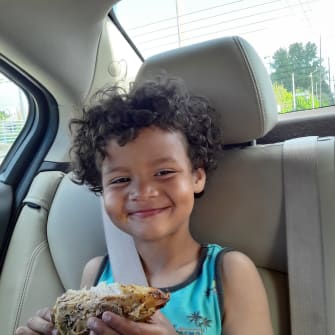
A new baby’s arrival – joy quickly turns to worry
Christan T. expected smooth sailing when it came to the pregnancy and birth of her son Izzack. “I felt like I was a pro,” she remembers thinking.
After all, Christan already had delivered four healthy children at MultiCare Good Samaritan Hospital in Puyallup. Her fifth pregnancy had been relatively routine and had been full term.
But when her newborn son named Izzack was only a few hours old, Christan thought he seemed unusually quiet. He also had no interest in eating. By the second day, Good Samaritans’ neonatal staff grew more concerned. Izzack’s nurse coaxed him to swallow a few drops of breast milk by squeezing a sponge into the back of his mouth. When their baby began to vomit at every feeding, his worried parents knew something was seriously wrong.
Instead of bringing their newborn home to his waiting family, Izzack was transferred by ambulance to the Level IV Neonatal Intensive Care Unit (NICU) at Tacoma General Hospital, which is supported by the pediatric surgeons at Mary Bridge Children’s Hospital, located on same hospital campus.
Pediatric general surgeon Dr. Tony Escobar directs Mary Bridge Children’s General & Thoracic Surgery Department. He suspected Izzack had Hirschsprung’s disease.
“Hirschsprung’s disease is a rare condition that can affect any part of the intestines but most commonly involves the colon,” explains Dr. Escobar. “The intestine’s muscles are missing certain nerve cells, called ganglion cells, which means that the stool does not move through the bowel normally.”
Hirschsprung’s disease – a serious diagnosis for baby Izzack
Hirschsprung’s disease is congenital or present at birth and is three times more likely to occur in boys. A bowel blockage is potentially life-threatening and requires surgery. Following a stomach x-ray and a biopsy to detect the ganglion cells’ absence in his colon, Izzack’s diagnosis was confirmed when he was only four days old.
“We were so lucky that Dr. Escobar happened to be on call that day,” Christan recalled. Hirschsprung’s disease usually takes more time to diagnose because the doctor needs to rule other reasons for a baby to have constipation or a bloated belly. “Dr. Escobar already had decades of experience researching and treating Hirschsprung’s, so we knew Izzack would get the absolute best care,” she added.
Dr. Escobar also determined that Izzack’s condition was a much more extreme type of Hirschsprung’s, only seen in 5% of total cases. Children with total colonic aganglionosis are born without any ganglion cells in the colon. This meant that a more significant portion of Izzack’s large and small intestines was affected. His treatment would also be more complicated.
Izzack’s “pull-through” surgery
The surgical treatment for Hirschsprung’s disease restores the body’s ability to pass stool normally. “Kids generally have a good outcome with the surgery and usually go on to live relatively normal lives in the long run,” notes Dr. Escobar.
Kids with advanced cases of Hirschsprung’s disease often need to have multiple surgeries. Dr. Escobar immediately performed an ileostomy, an opening in the intestinal wall, and then attached a bag to collect the stool. Five months later, Izzack was back in the operating room for his “pull-through” operation. Dr. Escobar first removed the non-working part of Izzack’s intestine. He then reconnected the healthy section of the small intestine to the anus by passing it through the rectum. This procedure allows stool to properly move through and out the body.
“Izzack, our hero”
Although still small for his age, Izzack is now about to turn seven. His parents celebrate every day of watching him enjoy a healthy, active life along with the rest of the family. He has some dietary restrictions, but “watching him eat is pure joy,” laughs Christan.
Izzack’s condition has not been without some common complications associated with Hirschsprung’s disease, and he has undergone more surgery. Last summer, he had another pull-through procedure and ileostomy that took thirteen hours. His recovery from the second surgery was remarkable. Three months later, Dr. Escobar closed the ileostomy, and Izzack is now having regular bowel movements.
He routinely visits Mary Bridge Children’s to see Dr. Escobar and Dr. Joseph Gramling, his pediatric gastroenterologist. The surgical and medical specialists’ team works together to coordinate Izaack’s ongoing treatment plan and any follow-up he needs as he grows and develops.
“I couldn’t have asked for a better experience,” says Christan. “Izzack’s amazing team at Mary Bridge has made everything so much more manageable.” As hands-on parents, they appreciate the extensive education and support they’ve received over the years learning how to care for their son’s condition. Christan also joined a Facebook group for parents of children with Hirschsprung’s disease, so she knows there may be issues that follow her son into adulthood.
Izzack, too, wants to understand what is going on with his body and participate in his own care. “Dr. Escobar always takes the time to explain to Izzack every detail of a new test or procedure,” adds Christan. “I don’t believe my son would be here today if we hadn’t had Dr. Escobar – he has been there every step of this rough road.”
Surgical specialists at Mary Bridge Children’s for comprehensive pediatric care
Dr. Escobar and his team of pediatric general & thoracic surgeons at Mary Bridge Children’s have advanced training and experience in performing a range of procedures, from routine to emergency surgery to fix a life-threatening condition like Hirschsprung’s disease. The surgical team also provides prenatal consultations for congenital disorders that may require surgery immediately after birth.
To learn more or for a referral, contact Mary Bridge Children’s General & Thoracic Surgery at 253-403-4613.